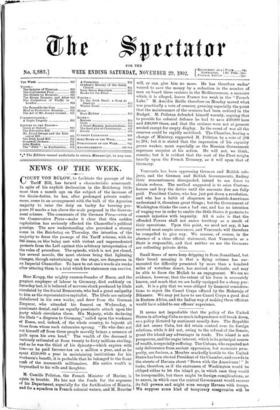It seems not improbable that the policy of the United
States in allowing Cuba so much independence will break down, as a policy dictated by sentiment usually does. The Republic did not annex Cuba, but did retain control over its foreign relations, while it did not, owing to the refusal of the Senate, grant the island any advantages in trade. The island is not prosperous, and the sugar interest, which is its principal source of wealth, is especially suffering. The Cubans, who expected not only deliverance from ancient oppression, but economic pros- perity, are furious, a Member markedly hostile to the United States has been elected President of the Chamber, and crowds in the streets of Havana shout "Down with the Americans ! " It looks, therefore, as if the statesmen of Washington would be obliged either to let the island go, in which case they would be irresponsible, but there might be foreign complications, or to annex, in which case the central Government would recover its full powers and might even occupy Havana with troops. We suppose some kind of temporary compromise will be
arranged, but the Americans may yet discover that their Constitution was made for sober Englishmen intent on order, rather than for Spanish-Americans, who are very like Spaniards without their haughty patience.



















































 Previous page
Previous page